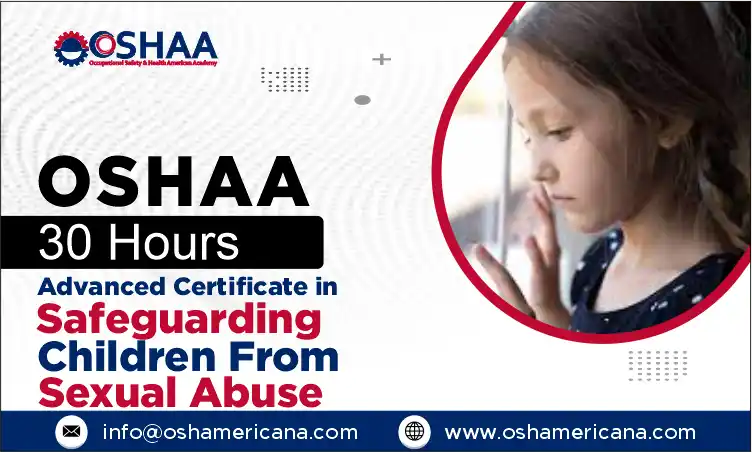Advance Your Career with the Professional Fire Safety Inspector Diploma
The OSHAA 30-Hours Professional Diploma in Fire Safety Inspector is an advanced, industry-recognized training program designed to prepare professionals to identify, assess, and manage fire risks in various workplace environments. In today’s complex industrial and commercial sectors, maintaining effective fire safety systems is not just a regulatory obligation but a moral and operational priority. This professional diploma equips participants with the essential skills to carry out comprehensive fire safety inspections, evaluate risk factors, and ensure that fire prevention systems, emergency exits, and detection devices meet international safety standards. The course reflects the growing global emphasis on OSHA-compliant fire safety management, ensuring that participants are fully capable of upholding workplace safety, legal compliance, and operational resilience.
Through the OSHAA 30-Hours Professional Diploma in Fire Safety Inspector, learners gain a deep understanding of fire behavior, ignition sources, and the mechanisms behind fire spread. The program provides comprehensive coverage of fire detection and alarm systems, evacuation procedures, emergency response coordination, and inspection methodologies aligned with global fire safety codes and regulations. Participants are trained to perform systematic fire safety audits, identify potential hazards, and implement corrective measures to prevent incidents before they occur. The course places a strong focus on practical applications, allowing learners to develop the technical and analytical capabilities required to assess compliance and maintain effective fire protection systems across different industrial and commercial settings.
The OSHAA 30-Hours Professional Diploma in Fire Safety Inspector is particularly relevant for safety officers, facility managers, fire marshals, and operations supervisors responsible for workplace safety management. It enhances their ability to design, implement, and monitor robust fire prevention strategies that protect lives, property, and business continuity. Learners acquire critical insights into OSHA regulations, national fire codes, and international standards that govern fire risk control and emergency preparedness. By understanding these frameworks, professionals can ensure that their organizations meet all legal and regulatory obligations while fostering a safety-first culture among employees.
In conclusion, the OSHAA 30-Hours Professional Diploma in Fire Safety Inspector is a comprehensive and transformative program that empowers professionals to uphold the highest standards of fire safety and compliance in the workplace. By combining in-depth theoretical knowledge with hands-on inspection training, this course ensures that participants are prepared to make informed, confident decisions that protect both people and property. Completing the OSHAA 30-Hours Professional Diploma in Fire Safety Inspector not only enhances individual competence and professional credibility but also contributes to creating safer, more compliant, and more resilient work environments worldwide.
OSHAA 30-Hours Professional Diploma in Fire Safety inspector
To enroll in the OSHAA 30-Hours Professional Diploma in Fire Safety Inspector, learners are expected to meet the following criteria:
1. Age Requirement
- Applicants must be at least 18 years of age to enroll in the OSHAA 30-Hours Professional Diploma in Fire Safety Inspector, ensuring they possess the maturity and responsibility required for professional training in workplace fire safety inspection.
- This age requirement aligns with global occupational safety training standards and prepares learners to handle real-world safety responsibilities and inspection duties confidently.
- The OSHAA 30-Hours Professional Diploma in Fire Safety Inspector is designed for adult learners seeking to enhance their professional capabilities in fire safety management, compliance, and inspection practices.
2. Educational Background
- Candidates enrolling in the OSHAA 30-Hours Professional Diploma in Fire Safety Inspector should possess at least a high school diploma or equivalent qualification, demonstrating foundational academic skills necessary for technical understanding and regulatory awareness.
- While prior education in occupational safety, engineering, or facility management is not mandatory, individuals with higher education or professional background in related fields will find it advantageous for deeper comprehension of advanced fire inspection principles.
- The OSHAA 30-Hours Professional Diploma in Fire Safety Inspector welcomes learners from diverse professional backgrounds, as the course provides comprehensive instruction tailored to various industry needs, from manufacturing to healthcare and construction sectors.
- A basic understanding of safety principles or workplace management will enhance the learner’s ability to grasp the regulatory, procedural, and technical aspects of the program.
3. Work Experience
- Prior work experience is not a strict requirement for enrollment in the OSHAA 30-Hours Professional Diploma in Fire Safety Inspector; however, having professional experience in occupational safety, facilities management, or fire protection is beneficial.
- Individuals currently working as safety officers, supervisors, engineers, or emergency response personnel will find the course especially relevant for expanding their fire inspection and compliance expertise.
- The OSHAA 30-Hours Professional Diploma in Fire Safety Inspector is equally suitable for beginners seeking to enter the field of fire safety, providing a strong foundational understanding of inspection procedures, fire prevention, and OSHA compliance.
- For experienced professionals, this diploma serves as a means to formalize their knowledge, achieve certification, and enhance their qualifications for career advancement within safety and compliance roles.
4. English Proficiency
- To successfully complete the OSHAA 30-Hours Professional Diploma in Fire Safety Inspector, learners must be proficient in reading, writing, and speaking English to understand technical materials, inspection guidelines, and international safety regulations.
- All instructional content, assessments, and practical training modules within the OSHAA 30-Hours Professional Diploma in Fire Safety Inspector are delivered in English, requiring a functional command of the language for effective participation.
- English proficiency ensures that learners can accurately interpret fire safety inspection documentation, OSHA regulatory standards, and emergency response protocols covered throughout the course.
- As this qualification adheres to global safety compliance standards, the ability to communicate and document findings in English is essential for learners aiming to work in international or multi-industry environments.
The OSHAA 30-Hours Professional Diploma in Fire Safety Inspector sets clear eligibility requirements to ensure that participants possess the academic, linguistic, and professional foundation needed to succeed. These criteria uphold the integrity and global recognition of the certification, ensuring that every learner who completes the OSHAA 30-Hours Professional Diploma in Fire Safety Inspector is fully prepared to perform fire safety inspections, promote regulatory compliance, and contribute effectively to workplace safety excellence.
Study Units
Learning Outcomes
Introduction to Fire Safety Regulations (2 Hours)
- Understand key UK fire safety regulations and their legal implications
- Recognise the importance of compliance with the Regulatory Reform (Fire Safety) Order 2005
- Identify the roles and responsibilities of fire safety inspectors in the workplace
- Gain an understanding of applicable fire safety standards and industry codes
- Develop awareness of the legal and financial consequences of non-compliance
Fire Risk Assessment (5 Hours)
- Learn the principles and methodology of conducting fire risk assessments
- Identify potential fire hazards across different environments
- Understand how to evaluate risks and the adequacy of existing control measures
- Learn how to recommend practical improvements to reduce fire risks
- Develop skills to prepare clear, accurate, and actionable assessment reports
Fire Prevention and Control Measures (5 Hours)
- Understand strategies used to prevent fires in various building types
- Gain knowledge of fire-resistant materials, fire barriers, and passive protection systems
- Learn how to assess and maintain active fire control measures such as extinguishers and sprinklers
- Develop the ability to evaluate effectiveness and recommend improvements
- Understand the importance of staff training in fire prevention and control
Fire Detection and Alarm Systems (6 Hours)
- Understand the components and operating principles of fire detection and alarm systems
- Learn how to inspect, test, and verify compliance of alarm systems
- Develop the ability to assess coverage, sensitivity, and response times
- Recognise common faults and identify corrective actions
- Understand ongoing maintenance requirements to ensure systems remain compliant
- Gain practical insight into evaluating system installation and performance
Emergency Evacuation Plans (4 Hours)
- Understand the importance of effective emergency evacuation planning
- Learn how to design, implement, and review evacuation plans for different workplaces
- Gain knowledge of legal requirements for evacuation procedures and signage
- Understand the value of staff training and regular fire drills
- Develop the ability to assess and enhance evacuation plan effectiveness
Fire Safety Equipment Inspection and Maintenance (5 Hours)
- Learn inspection and maintenance procedures for fire extinguishers, alarms, and emergency lighting
- Understand how to check functionality and operational readiness of equipment
- Develop the ability to identify faults and initiate corrective actions
- Gain knowledge of testing schedules and maintenance protocols
- Learn how to document inspections and maintenance activities for compliance
Dealing with Fire Incidents (3 Hours)
- Understand procedures for managing workplace fire emergencies
- Develop the ability to assess fire severity and respond appropriately
- Learn how to coordinate effectively with emergency services
- Gain practical knowledge of fire containment and safe evacuation
- Understand post-incident actions, including inspections, reporting, and review
The OSHAA 30-Hours Professional Diploma in Fire Safety Inspector offers extensive professional and practical benefits designed to strengthen the capabilities of individuals and organizations committed to maintaining high fire safety standards. This advanced training program provides globally recognized fire safety inspection skills, ensuring participants gain comprehensive knowledge of fire prevention, hazard identification, emergency preparedness, and compliance with international fire safety regulations.
By completing the OSHAA 30-Hours Professional Diploma in Fire Safety Inspector, learners not only enhance their professional credentials but also contribute significantly to creating safer workplaces, reducing fire-related risks, and ensuring regulatory compliance across industries. This program is vital for safety officers, inspectors, facility managers, and professionals seeking to advance their expertise in workplace fire protection, prevention, and emergency response management.
1. Comprehensive Knowledge of Fire Safety Regulations
- The OSHAA 30-Hours Professional Diploma in Fire Safety Inspector equips learners with in-depth knowledge of national and international fire safety laws, codes, and OSHA compliance requirements. Participants gain the ability to interpret and apply these standards effectively during inspections, ensuring that all workplace operations meet the required fire protection protocols.
2. Advanced Fire Risk Assessment Skills
- This course trains learners to perform systematic fire risk assessments across various work environments, identifying hazards, evaluating risks, and implementing effective control measures. The OSHAA 30-Hours Professional Diploma in Fire Safety Inspector empowers professionals to detect potential fire risks before they escalate, thereby safeguarding lives and property.
3. Enhanced Inspection and Audit Competence
- Learners develop the technical skills necessary to conduct detailed fire safety inspections and audits, ensuring that safety systems, alarms, and extinguishing equipment are fully functional and compliant. The OSHAA 30-Hours Professional Diploma in Fire Safety Inspector provides structured methodologies for reporting findings and recommending corrective actions that align with OSHA and industry best practices.
4. Strengthened Regulatory Compliance and Legal Assurance
- The OSHAA 30-Hours Professional Diploma in Fire Safety Inspector ensures that organizations meet statutory fire safety obligations and avoid penalties associated with non-compliance. Graduates play a key role in maintaining documentation, certifications, and audit readiness, thus strengthening legal protection and corporate accountability.
5. Improved Workplace Safety and Risk Reduction
- By applying the knowledge gained from the OSHAA 30-Hours Professional Diploma in Fire Safety Inspector, participants help minimize fire incidents, property damage, and loss of life. This proactive approach not only enhances overall workplace safety but also builds a strong safety culture across the organization.
6. Increased Career Advancement Opportunities
- Earning the OSHAA 30-Hours Professional Diploma in Fire Safety Inspector enhances professional credibility and opens doors to higher-level roles such as Fire Safety Officer, Safety Manager, or Compliance Auditor. The globally recognized certification validates the holder’s competence, making them more competitive in the international job market.
7. Practical Application of Fire Prevention Techniques
- Learners gain hands-on experience in implementing fire prevention strategies, managing evacuation plans, and maintaining safety systems. The OSHAA 30-Hours Professional Diploma in Fire Safety Inspector bridges the gap between theoretical knowledge and real-world application, empowering professionals to act decisively during emergencies.
8. Improved Emergency Preparedness and Response
- The course provides training on how to design and manage emergency response procedures. The OSHAA 30-Hours Professional Diploma in Fire Safety Inspector prepares professionals to lead evacuation drills, coordinate with emergency services, and respond effectively under pressure to minimize fire-related risks.
9. Organizational Cost Efficiency and Operational Continuity
- By implementing the preventive measures learned through the OSHAA 30-Hours Professional Diploma in Fire Safety Inspector, organizations can significantly reduce fire-related losses, downtime, and insurance premiums. The course contributes directly to maintaining operational continuity and resource optimization.
10. Leadership and Communication Skills Development
- The OSHAA 30-Hours Professional Diploma in Fire Safety Inspector helps learners develop essential leadership and communication skills for managing safety teams, conducting awareness sessions, and promoting safety culture across all departments. These soft skills are crucial for influencing positive behavioral change in workplace safety practices.
11. Strengthened Organizational Reputation and Credibility
- Completing the OSHAA 30-Hours Professional Diploma in Fire Safety Inspector demonstrates a company’s commitment to employee safety and regulatory excellence. This strengthens the organization’s image among clients, investors, and regulatory bodies, reinforcing trust and reliability.
12. Enhanced Technical Understanding of Fire Safety Systems
- Participants gain technical proficiency in assessing fire detection systems, sprinkler operations, and fire suppression mechanisms. The OSHAA 30-Hours Professional Diploma in Fire Safety Inspector ensures learners can evaluate, test, and verify the functionality of all safety components to maintain full compliance with industry standards.
13. Promotion of Worker Confidence and Productivity
- When employees know their workplace adheres to high fire safety standards, their sense of security and productivity naturally increases. The OSHAA 30-Hours Professional Diploma in Fire Safety Inspector indirectly contributes to improved morale and reduced absenteeism, as employees feel valued and protected.
14. Global Recognition and Transferable Skills
- The OSHAA 30-Hours Professional Diploma in Fire Safety Inspector offers internationally recognized certification, equipping professionals with transferable skills that can be applied in multiple industries and countries. This enhances career mobility and professional growth opportunities worldwide.
15. Continuous Improvement and Lifelong Learning
- The course encourages a mindset of continuous professional development by keeping participants updated with the latest fire safety inspection techniques and compliance updates. Through the OSHAA 30-Hours Professional Diploma in Fire Safety Inspector, learners stay aligned with evolving global standards, fostering innovation and long-term excellence in fire safety management.
Overall, the OSHAA 30-Hours Professional Diploma in Fire Safety Inspector delivers measurable value to individuals and organizations by enhancing safety performance, reducing operational risks, and fostering professional advancement. By mastering inspection procedures, fire prevention strategies, and compliance principles, graduates of the OSHAA 30-Hours Professional Diploma in Fire Safety Inspector become vital contributors to safer workplaces and stronger organizational resilience.
The OSHAA 30-Hours Professional Diploma in Fire Safety Inspector is designed for professionals, organizations, and stakeholders dedicated to maintaining workplace safety, regulatory compliance, and fire prevention excellence. This internationally recognized training program is ideal for those responsible for managing fire safety inspections, emergency preparedness, and risk management in various industries.
By combining global best practices with OSHA-aligned fire safety standards, the OSHAA 30-Hours Professional Diploma in Fire Safety Inspector ensures participants gain advanced knowledge and practical expertise essential for preventing fire hazards, ensuring legal compliance, and enhancing organizational safety performance. The course serves as a valuable professional development opportunity for individuals and companies seeking to strengthen fire safety governance and create a culture of prevention and responsibility across all operational levels.
1. Fire Safety Officers
- Fire safety officers play a critical role in identifying potential fire risks and implementing safety measures in the workplace.
- The OSHAA 30-Hours Professional Diploma in Fire Safety Inspector helps them expand their technical understanding of fire safety systems, inspection procedures, and preventive strategies.
- Participants gain advanced skills in evaluating workplace hazards and enforcing safety standards effectively.
- This course supports OSHA compliance by providing officers with the knowledge to maintain up-to-date documentation and ensure adherence to safety legislation.
2. Health, Safety, and Environment (HSE) Managers
- HSE managers oversee organizational safety strategies and compliance frameworks.
- The OSHAA 30-Hours Professional Diploma in Fire Safety Inspector provides them with the expertise to design and implement fire prevention programs that align with OSHA and international regulations.
- Learners gain practical tools to enhance safety audits, manage fire emergencies, and minimize operational risks.
- The course strengthens their ability to drive safety culture improvements and uphold compliance across all departments.
3. Facilities and Maintenance Managers
- Facilities managers are responsible for maintaining building safety and operational integrity.
- Through the OSHAA 30-Hours Professional Diploma in Fire Safety Inspector, they learn to assess fire detection systems, maintain emergency exits, and coordinate fire safety maintenance schedules.
- The program equips them to lead inspection teams and ensure that all facilities meet OSHA and local fire safety standards.
- By mastering inspection techniques, they contribute to reducing workplace incidents and ensuring occupant safety.
4. Construction Site Supervisors
- Supervisors in the construction industry face elevated fire hazards due to high-risk materials and equipment use.
- The OSHAA 30-Hours Professional Diploma in Fire Safety Inspector trains them to identify and mitigate fire hazards during construction operations.
- Participants gain essential knowledge in risk assessment, emergency response, and OSHA-compliant safety management.
- This enhances overall project safety and ensures regulatory compliance on construction sites.
5. Industrial Safety Inspectors
- Industrial inspectors play a pivotal role in maintaining compliance across manufacturing and production environments.
- The OSHAA 30-Hours Professional Diploma in Fire Safety Inspector equips them with the ability to conduct detailed fire safety inspections, identify non-compliance, and recommend corrective actions.
- Learners develop analytical and reporting skills that strengthen audit quality and ensure adherence to OSHA guidelines.
- The program enhances their professional credibility and promotes consistent safety improvements in industrial operations.
6. Emergency Response Coordinators
- Emergency coordinators manage critical fire safety and evacuation procedures during emergencies.
- The OSHAA 30-Hours Professional Diploma in Fire Safety Inspector provides specialized training in emergency planning, fire drills, and coordination with local authorities.
- Participants learn to lead teams effectively under pressure and ensure orderly, efficient responses.
- The course improves readiness, compliance, and resilience against fire-related emergencies.
7. Fire Wardens and Marshals
- Fire wardens and marshals are frontline responders during fire incidents.
- The OSHAA 30-Hours Professional Diploma in Fire Safety Inspector enhances their understanding of fire behavior, evacuation protocols, and use of firefighting equipment.
- The course empowers them to perform inspections, manage drills, and educate colleagues on fire prevention.
- Their enhanced competence directly supports OSHA compliance and strengthens organizational preparedness.
8. Risk Assessment Professionals
- Risk assessors evaluate workplace hazards and design mitigation strategies.
- By completing the OSHAA 30-Hours Professional Diploma in Fire Safety Inspector, they gain specialized knowledge in fire risk analysis and control measures.
- The training improves their ability to produce comprehensive reports and recommend practical fire safety solutions.
- This contributes to regulatory alignment, operational safety, and risk management excellence.
9. Corporate Safety Trainers and Consultants
- Safety trainers and consultants require updated knowledge to train others effectively.
- The OSHAA 30-Hours Professional Diploma in Fire Safety Inspector provides them with internationally recognized fire inspection methodologies and compliance frameworks.
- It enables them to deliver higher-quality training and consulting services to organizations across industries.
- This enhances their professional reputation and ensures the delivery of OSHA-compliant fire safety programs.
10. Business Owners and Senior Executives
- Organizational leaders hold legal and moral responsibility for workplace safety and compliance.
- The OSHAA 30-Hours Professional Diploma in Fire Safety Inspector helps them understand their role in policy implementation, inspection oversight, and regulatory compliance.
- They learn how to establish robust safety systems that protect employees, assets, and reputation.
- The program supports strategic decision-making that fosters a sustainable and compliant safety culture.
The OSHAA 30-Hours Professional Diploma in Fire Safety Inspector is an essential qualification for professionals across industries who aim to enhance their understanding of fire safety management and OSHA standards. It empowers participants with the technical expertise, inspection skills, and compliance knowledge required to uphold the highest standards of fire protection and prevention. Whether managing facilities, leading safety teams, or conducting inspections, this diploma ensures participants are equipped to enhance operational excellence, minimize fire-related risks, and maintain global compliance in any workplace environment.







